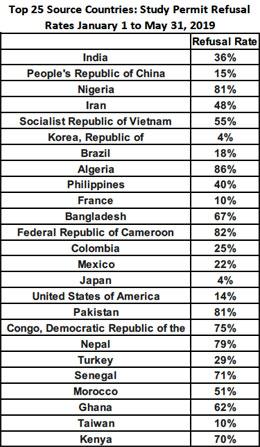Scams plague foreign student visa programs

By Mata Press Service
More than half the international students headed to undergraduate programs in Canada were turned away last year by immigration officials, a new research report has found
Between January and May, officers rejected 53 percent of the study permit applications filed by foreign students hoping to begin a bachelor program in Canada, according to data provided by Immigration, Refugees and Citizenship Canada to Polestar Research.
Refusal rates also vary dramatically by country, with students from Africa much less likely to receive a permit than students from many Asian and European countries.
The record refusal rate is part of a trend that has seen immigration officials refuse a higher proportion of applications every year as international demand for Canadian education has soared, reported studentimmigration.ca
Twenty-eight percent of all study permit applications were rejected by immigration officials in 2014. Four years later, in 2018, the overall rejection rate had climbed to 34 percent. Demand for education boomed in that same period, with total applications almost doubling to more than 340,000 in 2018.
Officials can refuse a study permit for many reasons: if they suspect the student may not return to their home country after graduation; if the student doesn’t have sufficient funds to pay for tuition and living costs while in Canada; if the student poses a health or security threat to Canada; if the officer doesn’t think the student’s academic plan makes sense; if the application is incomplete or inaccurate or if there is evidence of fraud in the application.
The latest refusal rate numbers come as Ottawa announced that it wants to diversify where international students come from and where they study in Canada.
International students in Canada spent an estimated $21.6 billion on tuition, accommodation and other expenses in 2018 with half of them coming from China and India.
A key aim of the new $148-million-strategy is to increase the variety of source countries for international students. It has pledged almost $30 million to diversify recruitment efforts in this domain.
More than 50 percent of Canada’s international students come from China and India, and they are concentrated in large cities such as Calgary, Toronto, and Vancouver.
The strategy’s expanded recruitment efforts will target Mexico, Colombia, Brazil, Vietnam, the Philippines, Indonesia, Thailand, Morocco, Turkey, France, and Ukraine.
Immigration Canada has warned that fraud had become a significant problem in study permit applications.
Earlier this month in Moga, Punjab, local authorities sealed the office of a travel agent on the orders of the Deputy Commissioner after it was found that the owner allegedly duped at least 200 applicants, mostly students, by issuing them fake Guaranteed Investment Certificates (GICs) for visa to Canada.
Moga police have also registered a case against Jasvir Singh, owner of travel agency English Tree, for allegedly cheating the applicants.
Police said the accused promised applicants to apply for GICs on their behalf, but actually did not apply and issued fake certificates.
Canadian authorities got them verified from banks and they were found to be fake. After the certificates were found to be fake by the Canadian High Commission, all applications were cancelled and the applicants debarred for five years, which means they cannot apply for Canadian immigration for next five years.
A major requirement to apply for a study permit through the Student Direct Stream is submitting a Guaranteed Investment Certificate (GIC) showing you have an investment account with a balance of CAD $10,000 or higher.
Students get their money back from their GIC once their start your studies in Canada. Usually, students receive a chunk of the amount invested when they first arrive in Canada, then the remaining is paid out in installments over the following years.






